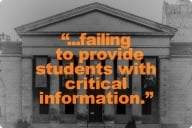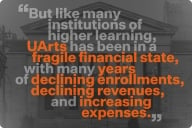You have /5 articles left.
Sign up for a free account or log in.
A federal audit has renewed confusion about whether the U.S. Department of Education will support bids by colleges to try an emerging form of competency-based education.
During the last 18 months the department has approved three institutions’ so-called "direct assessment" degree programs, which do not rely on the credit-hour standard and allow students to work at their own pace. The approach is backed by the White House, members of Congress from both political parties and department officials.
But a few of the handful of applications for direct-assessment programs languished in the federal bureaucracy for months. And the department turned away one applicant earlier this year for somewhat opaque reasons. The mixed messages, some said, may have prevented more institutions from applying.
Now the audit from the department's Office of Inspector General, which was released this week, criticizes aspects of the federal approval process for direct assessment programs. It also cited the potential for abuse with poor-performing versions of competency-based education and raised questions about the faculty role in direct assessment.
Several observers, including former department officials, said they were concerned that the audit might have a chilling effect. That could include hesitation by institutions to try direct assessment, as well as a more cautious approach by accreditors and the department.
However, others said the audit’s findings could lead to better communication and documentation for the application process, maybe even making for smoother reviews.
The inspector general acts as an independent auditor of the department. Earlier this year it called for tighter regulation of distance-education programs. This latest audit, which concluded in January, found that the department had failed to adequately assess the risks that direct assessment degrees could pose to federal aid programs.
For example, the audit report said the department did not address whether students might receive federal aid for “life experience.” It also said the reviews failed to determine if direct assessment programs require “regular and substantive interaction between students and faculty members.”
Most of the other findings were bureaucratic in nature and revolved around chiding the department for not adequately documenting its review process. Likewise, the report said the feds failed to communicate enough with regional accreditors, which must sign off on a direct-assessment program before a college can apply for federal aid eligibility.
However, the report also said the department should do more to ensure that direct-assessment programs are properly tied to credit-hour “equivalencies” for the purposes of measuring out federal aid.
“Direct assessment programs with improperly calculated credit- or clock-hour equivalencies could result in students receiving more Title IV funds than allowed,” according to the inspector general.
The faculty interaction and credit-hour questions appear to go the heart of the direct-assessment model, whose supporters say focuses on student learning and knowledge rather than hours spent on coursework.
David Bergeron is a former department official who worked on direct-assessment applications before he left last year and became vice president for postsecondary education at the Center for American Progress. Bergeron said the audit raised some legitimate issues about credit-hour equivalencies. But he didn’t agree with the concern about federal aid for life experience.
“At the heart of direct assessment is assessment,” he said in an email. “If someone comes in with life experience and can already meet a competency, why should they be required to sit through a course? And why should they be denied aid until they have taken the assessment?”
Familiar Tension
The department and accreditors face competing pressures when considering emerging models of higher education.
They are tasked with encouraging innovation, particularly the sort that will help students more efficiently and affordably earn college credentials. But regulators must also ensure academic quality. That means keeping “bad actors” among institutions from getting their hands in the federal aid pot.
The U.S. Congress opened the door to direct assessment when it last renewed the Higher Education Act, which is the law that governs federal financial aid. Yet despite Congressional approval, the regulatory side has proved tricky.
There is a “yawning gap” between the legislative language and department’s complex rules on direct assessment, said Paul LeBlanc, president of Southern New Hampshire University.
Last year Southern New Hampshire’s subsidiary, College for America, was the first to receive federal approval for direct assessment. Capella University followed. A third applicant, Northern Arizona University, was told that its competency-based programs should be credit-hour-based.
The department has been aware of the findings from the audit for most of this year, and the feds have continued be supportive of direct assessment. The department has worked with colleges on “experimental sites” projects, issued more guidance on direct assessment and approved another program. It gave the green light to the University of Wisconsin System’s proposal last month.
“While this inspector general report is new to us, it’s not new to the department,” said Amy Laitinen, deputy director of the New America Foundation's higher education program and a former official at the department and White House.
The department agreed with most of the audit's findings, and said it would publish a “Dear Colleague" letter to clarify the differences between direct assessment and other competency-based programs.
The Dear Colleague letter, which is expected sometime soon, will also address the interaction between faculty and students, according to the audit.
College for America was referenced in the audit's section on faculty, although not by name. The report said College for America’s application did not adequately explain whether its coaches, who help guide students through their studies, were actually faculty members or had subject matter experience.
However, LeBlanc said College for America employs faculty members as well as coaches, and both are deeply engaged with students. The report failed to even mention the role of faculty there, he said.
LeBlanc also said the audit's language does not square with the rigorous reviews that both a regional accreditor and the department conducted on College for America.
“The tone suggests laxity that was not there in our experience,” he said.
It’s unclear whether the audit will make it tough for other institutions to follow the lead of College for America, Capella and the Wisconsin System. But several observers said Congress could help resolve some of the department’s internal debate on how to handle direct assessment.
“The department has gone as far as it can with the authority it has,” said Laitinen.








